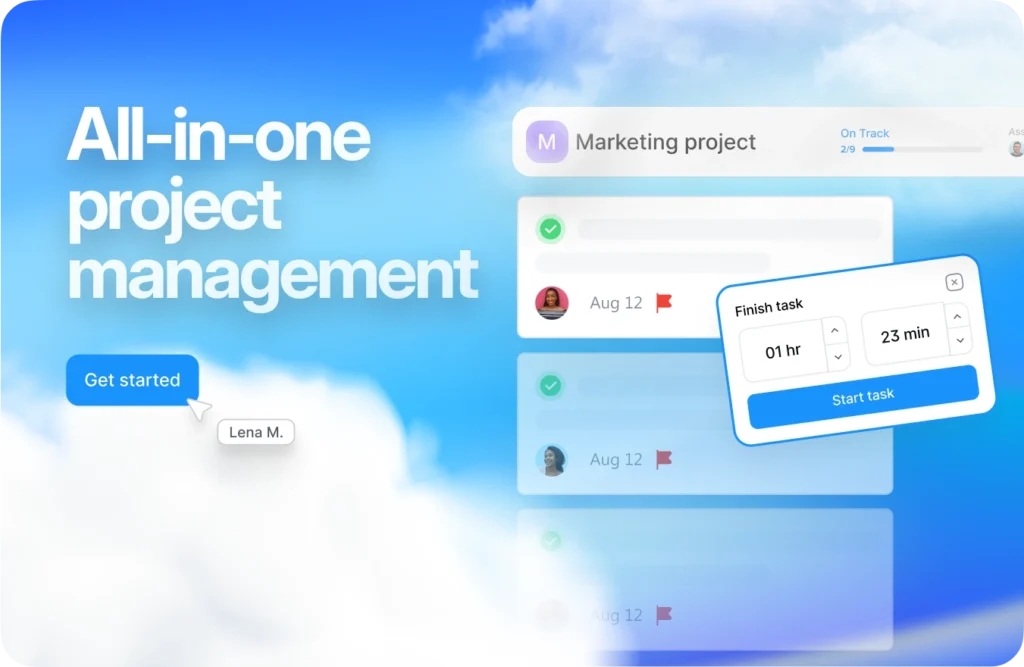What is a Project Manager & What Do They Do?

A Project Manager (PM) is a professional responsible for planning, organizing, and overseeing the completion of specific projects within an organization. They ensure that these projects are completed on time, within scope, and on budget.
PMs work in various industries and are crucial for driving a project from inception to completion, ensuring that all project objectives are met. By coordinating various aspects of a project and managing teams effectively, PMs play a vital role in achieving strategic goals and delivering value.
Understanding the Role of a Project Manager
A project manager (PM) is responsible for planning, executing, and closing projects while ensuring all project goals align with business objectives. They coordinate between teams, manage resources, and oversee budgets and deadlines.
Key Aspects of a Project Manager’s Role:
- Planning: Creating a roadmap for the project with defined objectives and timelines.
- Execution: Overseeing the team’s progress and ensuring tasks are completed efficiently.
- Monitoring & Controlling: Tracking performance, identifying risks, and making adjustments as necessary.
- Communication: Acting as a bridge between stakeholders, team members, and clients.
- Closure: Delivering the final product, ensuring all requirements are met, and documenting lessons learned.
Project managers serve as the backbone of any project, ensuring everything stays on track while handling unforeseen challenges.

Key Project Manager Responsibilities
A project manager’s responsibilities can vary depending on the industry, company size, and project complexity. However, some core duties remain consistent across all fields.
1. Defining Project Scope & Objectives: Before any work begins, a project manager must outline the scope, deliverables, and success criteria of the project. This prevents scope creep and ensures alignment with business goals.
2. Creating Project Plans & Timelines: A structured timeline helps teams stay on track. PMs use tools like Gantt charts and Agile methodologies to set clear milestones.
3. Budgeting & Resource Allocation: A successful project stays within budget. PMs allocate resources effectively, ensuring costs don’t spiral out of control.
4. Risk Management: Identifying potential risks early allows PMs to develop mitigation strategies, ensuring projects don’t face major setbacks.
5. Team Leadership & Coordination: A project manager fosters teamwork, assigns roles, and ensures everyone collaborates effectively. Strong leadership is key to keeping morale high and projects running smoothly.
6. Communication & Stakeholder Management: PMs must provide regular updates to stakeholders, ensuring transparency and aligning expectations.
7. Ensuring Quality Control: Delivering a project that meets the client’s or company’s expectations requires continuous quality checks throughout the process.
8. Documentation & Reporting: Keeping detailed records of project progress, decisions, and outcomes helps in post-project analysis and future improvements.
Each of these responsibilities ensures a project moves from conception to completion with minimal disruptions.
Essential Skills of a Project Manager
To succeed in project management, professionals need a mix of technical and soft skills.
1. Leadership: Project managers must inspire and guide teams, making critical decisions and keeping team members motivated.
2. Communication: Clear and effective communication with stakeholders, team members, and clients ensures transparency and avoids misunderstandings.
3. Time Management: Projects often run on tight schedules. The ability to prioritize tasks and manage time effectively is crucial.
4. Problem-Solving & Critical Thinking: Unexpected issues can arise at any time. A great PM thinks on their feet and finds solutions quickly.
5. Risk Management: Anticipating and mitigating risks ensures smoother project execution.
6. Budgeting & Financial Management: Managing resources efficiently helps prevent overspending and keeps the project financially viable.
7. Technical Knowledge: Depending on the industry, a project manager should understand relevant technologies and processes. For example, IT PMs need to understand software development cycles, while construction PMs must know about building materials and engineering principles.
A well-rounded project manager continuously improves these skills to stay competitive in their field.
Developing Project Management Skills for Success
Becoming a great project manager takes time, experience, and continuous learning. Here are ways to develop essential PM skills:
1. Gain Hands-On Experience
Start by managing small projects or assisting experienced PMs. Real-world experience is the best teacher.
2. Take Project Management Courses
Enroll in courses like:
• PMP (Project Management Professional) Certification
• PRINCE2 (Projects IN Controlled Environments)
• Agile & Scrum Master Certification
3. Develop Leadership & Communication Skills
Leading a team requires strong interpersonal skills. Practice effective communication and learn conflict resolution techniques.
4. Learn to Use Project Management Software
Familiarize yourself with tools like:
- Peerbie
- Asana
- Trello
- Microsoft Project
- Jira
5. Stay Up-to-Date with Industry Trends
Follow project management blogs, attend webinars, and network with other professionals to keep up with best practices.
Tools Used by Project Managers
Project managers rely on various tools to stay organized and enhance efficiency.
1. Task Management Software
- Peerbie & Asana – Great for visualizing tasks and workflows.
- Jira – Commonly used in Agile software development projects.
2. Time Tracking & Scheduling
- Monday.com – Helps with scheduling and tracking progress.
- Microsoft Project – Ideal for complex project timelines.
3. Collaboration & Communication
- Peerbie & Microsoft Teams – Ensures seamless team communication.
- Zoom & Google Meet – For virtual meetings and discussions.
4. Budgeting & Financial Management
- QuickBooks – For tracking project finances.
- Smartsheet – For financial planning and budget analysis.
Utilizing these tools helps project managers streamline workflows and improve overall efficiency.

Challenges Faced by Project Managers
Despite their expertise, project managers encounter numerous obstacles, including:
1. Unclear Project Scope: Without well-defined objectives, projects can drift off course, leading to delays and budget overruns.
2. Resource Constraints: Limited staff, budget, or time can make execution difficult.
3. Communication Barriers: Miscommunication between teams or stakeholders can result in misunderstandings and errors.
4. Risk & Uncertainty: Unforeseen changes (e.g., market shifts, technology failures) require adaptability.
5. Managing Stakeholder Expectations: Balancing client demands, executive expectations, and team capacity is often challenging.
Overcoming these hurdles requires experience, flexibility, and proactive problem-solving.
How to Become a Project Manager?
Interested in pursuing a career in project management? Follow these steps:
1. Get a Relevant Degree
A degree in business, engineering, IT, or a related field can provide a strong foundation.
2. Gain Work Experience
Start with entry-level roles in project coordination, then work your way up.
3. Obtain Certifications
- PMP (Project Management Professional)
- Certified Scrum Master (CSM)
- PRINCE2
4. Develop Key Skills
Improve leadership, communication, and time management abilities.
5. Network & Stay Updated
Join professional associations like the Project Management Institute (PMI) and attend industry events.
Different Types of Project Managers
Project managers can specialize in various fields, including:
- IT Project Managers – Oversee software development projects.
- Construction Project Managers – Manage building and infrastructure projects.
- Marketing Project Managers – Handle advertising and branding campaigns.
- Healthcare Project Managers – Lead medical and hospital-related initiatives.
Choosing a specialization depends on your interests and industry knowledge.
Project managers play a critical role in driving business success. By mastering essential skills, gaining experience, and leveraging the right tools, aspiring PMs can build rewarding careers in various industries. They are the backbone of any project, ensuring seamless execution, risk management, and stakeholder satisfaction.
In today’s fast-evolving world, businesses rely on skilled project managers to adapt to market changes, optimize resources, and deliver high-quality results. Whether you’re starting your journey or looking to advance in your career, continuous learning and hands-on experience are key to long-term success.
As industries continue to embrace digital transformation, the demand for competent project managers is higher than ever. With the right mindset, training, and dedication, you can carve a prosperous path in this exciting and dynamic profession.

